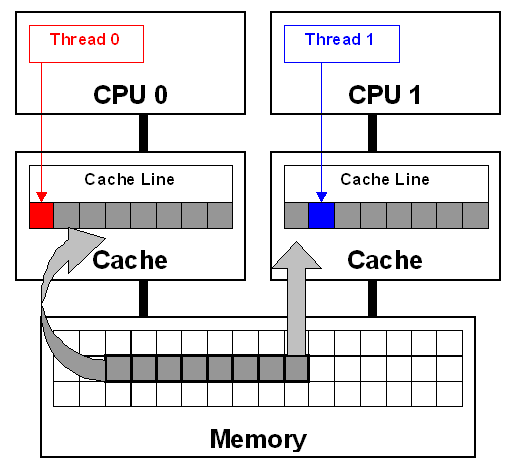False Sharing问题
来源:互联网 发布:制作签名档的软件 编辑:程序博客网 时间:2024/05/13 14:40
在多处理器,多线程情况下,如果两个线程分别运行在不同的CPU上,而其中某个线程修改了cache line中的元素,由于cache一致性的原因,另一个线程的cache line被宣告无效,在下一次访问时会出现一次cache line miss,哪怕该线程根本无效改动的这个元素,因此出现了False Sharing问题【1】。
如下图所示,thread1修改了memory灰化区域的第[2]个元素,而Thread0只需要读取灰化区域的第[1]个元素,由于这段memory被载入了各自CPU的硬件cache中,虽然在memory的角度这两种的访问时隔离的,但是由于错误的紧凑地放在了一起,而导致了,thread1的修改,在cache一致性的要求下,宣告了运行Thread0的CPU0的cache line非法,从而出现了一次miss,导致从小从memory中读取到cache line中,而一致性的代价付出了,但结果并不是thread0所care的,导致了效率的降低。关于实验可以参考[2]。
因此在多核编程情况下,要特别注意False Sharing问题。
解决的方法可以是:详细参见【1】
__declspec (align(64)) int thread1_global_variable;
__declspec (align(64)) int thread2_global_variable;
或者是

【1】http://software.intel.com/en-us/articles/avoiding-and-identifying-false-sharing-among-threads/
【2】http://www.codeproject.com/KB/threads/FalseSharing.aspx
- False Sharing问题
- False Sharing问题
- False Sharing问题
- false sharing 问题
- 多线程之false sharing问题
- False sharing问题及其解决方法
- 多线程 False Sharing问题-ok
- false sharing
- False Sharing
- false sharing
- 多线程伪共享(false sharing)问题分析
- 多线程伪共享(false sharing)问题分析
- 多线程伪共享(false sharing)问题分析
- 多核平台下Cache的False Sharing问题
- 由一道淘宝面试题到False sharing问题
- 由一道淘宝面试题到False sharing问题
- 多核编程中伪共享问题(false sharing)
- 伪共享false sharing
- DOS必备命令
- [TOJ]3243 Blocked Road --线段树
- Eclipse Tabbed Properties View
- dba职业规划
- grub2
- False Sharing问题
- vsftpd 添加用户及锁定用户目录
- android中对服务的应用管理
- 北京软考高级资格俱乐部(诚交软考高级资格朋友,搭建高级资格俱乐部)
- Web前端开发之“常见模块你真的很了解吗?”
- 十大中文原创文学站点与开国十大元帅
- DateTime简单总结
- 关于CStdioFile
- smarty 页面显示问题。。。。。


